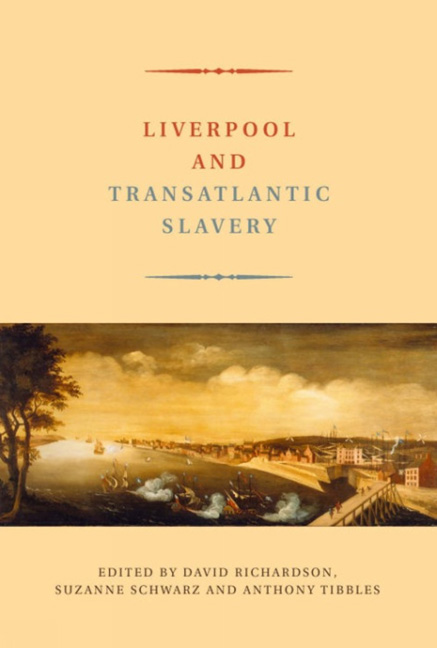Book contents
- Frontmatter
- Content
- Preface
- Notes on Contributors
- Introduction Liverpool, the African Slave Trade and Abolition Thirty Years On
- 1 Liverpool's Dominance in the British Slave Trade, 1740–1807
- 2 African Agency and the Liverpool Slave Trade
- 3 Human Capital in the British Slave Trade
- 4 Liverpool's Slave Trade to the Colonial Chesapeake: Slaving on the Periphery
- 5 The Liverpool Slave Trade, Lancaster and its Environs
- 6 The Atlantic Slave Trade and African Ethnicities in Seventeenth-Century Jamaica
- 7 The Wealth and Social Aspirations of Liverpool's Slave Merchants of the Second Half of the Eighteenth Century
- 8 ‘Cemented by the Blood of a Negro’? The Impact of the Slave Trade on Eighteenth-Century Liverpool
- 9 Commerce, Civilization and Christianity: The Development of the Sierra Leone Company
- 10 Abolitionism in Liverpool
- Index
7 - The Wealth and Social Aspirations of Liverpool's Slave Merchants of the Second Half of the Eighteenth Century
- Frontmatter
- Content
- Preface
- Notes on Contributors
- Introduction Liverpool, the African Slave Trade and Abolition Thirty Years On
- 1 Liverpool's Dominance in the British Slave Trade, 1740–1807
- 2 African Agency and the Liverpool Slave Trade
- 3 Human Capital in the British Slave Trade
- 4 Liverpool's Slave Trade to the Colonial Chesapeake: Slaving on the Periphery
- 5 The Liverpool Slave Trade, Lancaster and its Environs
- 6 The Atlantic Slave Trade and African Ethnicities in Seventeenth-Century Jamaica
- 7 The Wealth and Social Aspirations of Liverpool's Slave Merchants of the Second Half of the Eighteenth Century
- 8 ‘Cemented by the Blood of a Negro’? The Impact of the Slave Trade on Eighteenth-Century Liverpool
- 9 Commerce, Civilization and Christianity: The Development of the Sierra Leone Company
- 10 Abolitionism in Liverpool
- Index
Summary
In his account of the slave trade Eric Williams emphasized the extraordinary profits generated by the trade and, more specifically, its contribution to the growth and prosperity of Liverpool. However, his approach to the latter was very generalized; he did not analyse in any depth the degree of financial success of the individuals who invested in the Liverpool slave trade. This paper attempts to rectify this omission. To do so it draws on sources and methodologies used by others to calculate the wealth of certain groups of eighteenth–century British people and apply them to estimate the wealth of Liverpool slave merchants. Extension of the methodology also allows us to explore how that wealth was used to shape the lives of the offspring of slave merchants. In recent years emphasis has been placed on the social uses of wealth generated by the slave trade. For instance, in one recent book the significance of profits made from the slave trade to ‘the urban renaissance’ in Bristol in the period c.1689–1820 has been stressed. More broadly, the accumulation of wealth through the slave trade and the spending thereof is related to the ‘rise of gentility’ and the growth of consumerism in the eighteenth century, which have been of considerable interest to historians in recent decades.
The purposes of this paper, which is very much a preliminary study, are to attempt to assess the extent of the wealth of Liverpool slave merchants and to examine how far their spending of it enabled them to satisfy their social aspirations, and thereby shed light on the broader national picture and possibly also on the issue of how far profits from the slave trade contributed to and sustained Liverpool's growth. For the purposes of this study discussion of the aspirations of the slave merchants is confined to:
1. The acquisition of property, for example, a grander house in a more fashionable location, possibly suburban or even rural, and/or land either locally or further afield, ideally a substantial landed estate;
2. A successful marriage, perhaps to a daughter of a landed gentleman, a professional person, or an officer in the armed forces, thereby reflecting enhanced social status;…
- Type
- Chapter
- Information
- Liverpool and Transatlantic Slavery , pp. 164 - 226Publisher: Liverpool University PressPrint publication year: 2007



